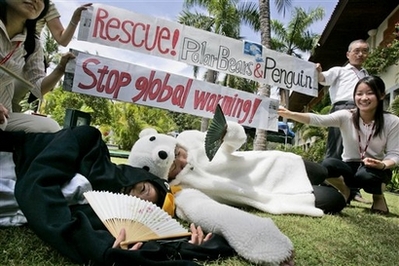China: West should do more to cope with warming
(Agencies\chinadaily.com.cn)
Updated: 2007-12-09 11:45
Updated: 2007-12-09 11:45
Developing countries led by China squabbled with the West over mandatory emission cuts at the Bali climate change conference, as environmental activists accused Canada of undermining the negotiations by insisting on mandatory targets for poor nations.
Chinese representative to the world conference on Saturday questioned the fairness of binding cuts when China’s per capita emissions are only about one-sixth of America's. Beijing said that it has been pumping pollutants into the atmosphere for a mere of three decades, whereas the Western developed countries have done so for hundreds of years.
"China is in the process of industrialization and there is a need for economic growth to meet the basic needs of the people and fight against poverty," said Su Wei, a top climate expert for Chinese government and member of its delegation at the U.N. Climate Change Conference in Bali, Indonesia.
"I just wonder whether it's fair to ask developing countries like China to take on binding targets," Su said. "I think there is much room for the United States to think whether it's possible to change its lifestyle and energy consumption patterns in order to contribute to the global climate."
Delegates from nearly 190 nations are attending the December 3-14 meeting in Bali and are likely to agree to launch negotiations that will lead to an international accord to succeed the 1997 Kyoto Protocol on global warming. They also are expected to set a deadline for completing negotiations.
The Kyoto Protocol, which has been rejected by the United States, commits three dozen industrialized countries to cut their greenhouse gases an average of 5 percent below 1990 levels between next year and 2012, when it expires.
Indonesian Environment Minister Rachmat Witoelar, who is president of the conference, said discussions on starting post-Kyoto negotiations were on track and that "God willing" an agreement would be reached by next weekend.
"There is no deadlock," he said. "I would think about 85 percent of those in the room have the same direction."
However, according to an Associated Press report on Saturday, Climate Action Network Canada, a coalition of Canadian environmental groups, said Canadian negotiators in Bali have been told to "demand that poorer nations accept the same binding absolute emission reduction targets as developed nations."
"The Kyoto Protocol is built on the recognition that industrialized countries are largely responsible for the problem of climate change, and must take the lead in tackling it," said Steven Guilbeault of the environmental group Equiterre. "Canada is trying to rewrite history by putting the burden of emissions reductions on poorer countries."
Climate Action Network Canada provided reporters a one-page document that it described as a leaked copy of Canada's negotiating stance. It was impossible to verify the authenticity of the document, and a spokesman for the Canadian delegation did not respond to a request for comment.
The chief U.N. climate scientist, Rajendra Pachauri, said it was next to impossible to expect the developing poor countries to agree to cuts when their per capita emissions are so much less than the West.
"What is absolutely essential is to see that the developed countries establish a record of action and commitment, which I think will induce and provide a moral basis for developing countries to assume the burden," Pachauri said.
"In the absence of that, I don't think anything is going to happen. With per capita levels being so different, it's not likely that anybody in the developing world would accept binding commitments."
Angus Friday, chairman of the Alliance of Small Island States, many of which are threatened by sea level rises, said developed countries had a "moral responsibility" to show leadership on the issue and act first to tackle global warming since they have contributed far more to the problem than poor countries.
|
|
|
||
|
||
|
|
|
|
